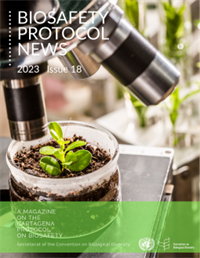 |
|
Latest Issue: No. 18 - 2023
Special edition: Outcomes of the tenth meeting of the Conference of the Parties serving as the meeting of the Parties to the Cartagena Protocol on Biosafety and of the fifteenth meeting of the Conference of the Parties to the Convention on Biological Diversity
|
-David Cooper, Acting Executive Secretary of the Secretariat of the Convention on Biological Diversity, United Nations Environment Programme
 |
|
Technology is always changing, and that includes biotechnology. Biotechnology should go hand in hand with biosafety measures that are effective in safeguarding biological diversity. The adoption of the Implementation Plan and the Capacity-Building Action Plan for the Cartagena Protocol on Biosafety are critical tools for advancing the biosafety agenda over the coming years. Target 17 of the Kunming-Montreal Global Biodiversity Framework is also key to strengthen biosafety measures and capacity. We can all contribute to the success of the frameworks.
|
Outcomes of the second part of the fifteenth meeting of the Conference of the Parties to the Convention on Biological Diversity and of the tenth meeting of the Conference of the Parties serving as the meeting of the Parties to the Cartagena Protocol on Biosafety
The Conference of the Parties to the Convention on Biological Diversity adopted the Kunming-Montreal Global Biodiversity Framework at the second part of its fifteenth meeting. The Framework includes four long-term goals for 2050 and 23 action-oriented global targets to be achieved by 2030.
The second part of the tenth meeting of the Conference of the Parties serving as the meeting of the Parties to the Cartagena Protocol on Biosafety was held in parallel with the fifteenth meeting of the Conference of the Parties to the Convention and the fourth meeting of the Conference of the Parties serving as the meeting of the Parties to the Nagoya Protocol on Access to Genetic Resources and the Fair and Equitable Sharing of Benefits Arising from Their Utilization.
A total of 163 Parties to the Cartagena Protocol and 17 non-Parties attended the tenth meeting of the Conference of the Parties serving as the meeting of the Parties to the Protocol. The meeting resulted in a large number of significant outcomes, including 13 decisions, that put the Protocol in a position where it can contribute to the Framework and advance the effective implementation of the Protocol in a changing world.
Parties adopted the Implementation Plan for the Protocol as a follow-up to the Strategic Plan for the Cartagena Protocol for the period 2011–2020. The Implementation Plan is a framework of broad desirable achievements and accomplishments aimed at guiding Parties in their implementation of the Protocol and in measuring progress for the period up to 2030. Several objectives and indicators are outlined for each goal, while outcomes describe what the effect of achieving each goal will be.
Parties recognized the complementarity of the Implementation Plan and of the Framework, and how the Plan can contribute to the achievement of the Framework goals and targets relevant to biosafety, especially for Parties to the Convention that are also Parties to the Protocol.
Outcomes of the tenth meeting of the Conference of the Parties serving as the meeting of the Parties to the Cartagena Protocol on key issues for the Protocol
Compliance

The Conference of the Parties serving as the meeting of the Parties to the Cartagena Protocol considered the report of the Compliance Committee and took note of its recommendations. It reminded Parties of their obligation to designate national focal points for the Protocol and the Biosafety Clearing-House, as well as competent national authorities and points of contact for the purposes of receiving notifications, in compliance with Article 17 of the Protocol. It also urged Parties and invited other Governments to provide voluntary funds in support of Parties that had developed compliance action plans. In considering its assessment and review of the Protocol and the final evaluation of its Strategic Plan for the period 2011–2020, Parties to the Protocol were urged that had not yet fully done so to put in place legal, administrative and other measures to implement their obligations under the Protocol, in particular biosafety legislation, as a matter of priority, and it recognized that further support was needed in that area. It also expressed concern about the low number of fourth national reports submitted. In this regard, the Executive Secretary was requested to develop an online survey on the national limitations and challenges in fulfilling the obligation to take the necessary legal, administrative and other measures to implement the Protocol and the obligation to submit a national report in a timely manner. The Executive Secretary is to make the results of the survey available to the Compliance Committee at its eighteenth meeting, scheduled for October 2023.
Further information on compliance is available:
here
Assessment and Review

The Conference of the Parties recognized the usefulness of the Strategic Plan for the Cartagena Protocol on Biosafety for the period 2011–2020 in supporting national implementation. It considered the operational objectives of the Strategic Plan and identified areas where progress had been made, and areas where further work was needed. It also welcomed the contribution of the Liaison Group and the Compliance Committee established under the Protocol to the fourth assessment and review of the Protocol and the final evaluation of the Strategic Plan. The Conference of the Parties requested that the Liaison Group and the Compliance Committee continue to provide input for the fifth assessment and review and the evaluation of the new Implementation Plan for the Protocol.
Further information on assessment and review is available:
here
Socio-economic considerations

The Conference of the Parties invited Parties, other Governments, relevant organizations and other stakeholders to cooperate and share relevant experiences on taking socioeconomic considerations into account in making decisions on living modified organisms (LMOs), in accordance with Article 26 of the Protocol, to use the voluntary guidance on the assessment of socioeconomic considerations in the context of Article 26 of the Protocol and to submit experiences in the use of such guidance to the Executive Secretary, as well as examples of methodologies and applications of socioeconomic considerations in the light of the guidance. It requested the Executive Secretary to contact those Parties that had indicated in their fourth national report: (a) having specific approaches or requirements that facilitated how socioeconomic considerations should be taken into account in decision-making on LMOs; or (b) having taken into account socioeconomic considerations arising from the impact of LMOs on the conservation and sustainable use of biological diversity. It also requested those Parties to share information on their experiences, as relevant to Article 26. It requested the Executive Secretary to compile the information received and to submit it for consideration at its eleventh meeting.
Further information on socio-economic considerations is available:
here
Nagoya – Kuala Lumpur Supplementary Protocol on Liability and Redress

The Conference of the Parties serving as the meeting of the Parties to the Nagoya-Kuala Lumpur Supplementary Protocol on Liability and Redress noted with regret the limited number of Parties to the Protocol that had ratified the Supplementary Protocol, and it underlined the importance of awareness-raising and capacity-building activities to support further ratifications and implementation. It welcomed the study on financial security mechanisms, reminded Parties to the Supplementary Protocol of the polluter pays principle and encouraged them to take the principle into account, where applicable, when further developing financial security mechanisms. It requested Parties to the Supplementary Protocol and invited other Governments to submit information to the Executive Secretary on the measures that they had in place to provide for financial security for damage from LMOs, and requested the Executive Secretary to compile the information submitted for consideration at its eleventh meeting. Lastly, it decided that the first assessment and review of the effectiveness of the Supplementary Protocol would be undertaken in the context of the fifth assessment and review of the effectiveness of the Cartagena Protocol.
More information is available:
here
Risk assessment and risk management of LMOs

The Conference of the Parties welcomed the outcomes of the discussions of the Ad Hoc Technical Expert Group on Risk Assessment on the topics of LMOs containing engineered gene drives and living modified fish and endorsed its recommendation that additional voluntary guidance materials be developed to support the case-by-case risk assessment of LMOs containing engineered gene drives.
The Conference of the Parties established a new ad hoc technical expert group on risk assessment and requested the Executive Secretary to convene discussions of the Online Forum on Risk Assessment and Risk Management to review an outline of the additional voluntary guidance materials and to support the work of the Expert Group. It also requested the Subsidiary Body on Scientific, Technical and Technological Advice, at its twenty-sixth meeting, to consider the outcomes of the Group and to prepare a recommendation for consideration at the eleventh meeting of the Conference of the Parties. An online forum was held from 10 to 21 April 2023 and the Group will convene later in 2023.
More information on risk assessment and risk management is available:
here
Detection and Identification of LMOs

The Conference of the Parties welcomed the publication of the Training Manual on the Detection and Identification of Living Modified Organisms in the Context of the Cartagena Protocol on Biosafety (Biosafety Technical Series No. 5). It invited Parties and relevant organizations to submit information on their experience with detecting newly developed and unauthorized LMOs and developing reference materials, as well as ongoing collaborations involving national and regional laboratories. It requested the Subsidiary Body on Scientific, Technical and Technological Advice to consider at its twenty-fifth or twenty-sixth meeting the information submitted by Parties and relevant organizations and to prepare a recommendation for consideration at the eleventh meeting of the Conference of the Parties regarding the need to update the training manual. In addition, it requested the Executive Secretary to continue work related to this topic, such as facilitating online discussions of the Network of Laboratories for the Detection and Identification of Living Modified Organisms.
More information on detection and identification, is available:
here here and here
Biosafety Clearing-House

The Conference of the Parties welcomed the migration of the Biosafety Clearing-House to a new platform. It requested the Executive Secretary to continue to maintain and make necessary improvements to the Clearing-House.
More information on the BCH is available:
here
Monitoring and reporting

The Conference of the Parties expressed concern about the low number of fourth national reports on the implementation of the Protocol that had been submitted and about delays in submitting projects to the Global Environment Facility (GEF) to support eligible Parties in the preparation of those reports. It welcomed the draft format for the fifth national report and stressed the importance of the timely submission of that report to facilitate the midterm evaluation of the Implementation Plan for the Protocol. It requested Parties and invited other Governments to submit their fifth national reports to the Secretariat at the same time as the seventh national reports due under the Convention.
More information on monitoring and reporting is available:
here
Capacity-building

The Conference of the Parties adopted a new capacity-building action plan for the Protocol, for the period up to 2030. Its purpose is to facilitate the development and strengthening of the capacities of Parties to implement the Protocol by: (a) identifying key areas for capacity-building related to the various goals of the Implementation Plan for the Protocol; (b) facilitating the engagement of partners, including donors; (c) fostering a coherent and coordinated approach to capacity-building for the implementation of the Protocol; and (d) promoting regional and international cooperation and coordination. The Action Plan is aligned with the Implementation Plan, outlining examples of capacity-building activities for each goal of the Implementation Plan.
More information on capacity-building is available:
here
Financial mechanism

The Conference of the Parties serving as the meeting of the Parties to the Protocol recommended that the Conference of the Parties to the Convention, in adopting its guidance to GEF with respect to support for the implementation of the Protocol, invite GEF to: (a) strengthen its funding programme dedicated to the Protocol to support eligible Parties in implementing the Protocol and its Implementation Plan and Capacity-building Action Plan; (b) improve and simplify the modalities for access to its funding for the Protocol, to support eligible Parties in the implementation of the Protocol and its Implementation Plan and Capacity-building Action Plan; (c) continue to make funds available in a timely manner to support eligible Parties in preparing and submitting their fifth national reports; (d) continue to assist eligible Parties in undertaking activities in the following areas: development and implementation of legal, administrative and other measures to implement the Protocol; risk assessment and risk management; detection and identification of LMOs; public awareness, education and participation; socioeconomic considerations; liability and redress; national reporting; information sharing and the Biosafety Clearing-House; and knowledge and technology transfer; and the implementation of compliance action plans regarding the achievement of compliance with the Protocol.
The Conference of the Parties also invited the GEF Council to examine the possibility of creating a finance window specifically for the Protocol. It urged Parties to the Convention that were also Parties to the Protocol to include biosafety projects in their utilization of the funding allocated to them under the System for Transparent Allocation of Resources for the eighth replenishment period of the GEF Trust Fund, taking into account the Implementation Plan and Capacity-building Action Plan for the Protocol, their obligations under the Protocol and the guidance of the Conference of the Parties to the Convention to GEF. It also encouraged Parties to include needs and provisions for the implementation of the Protocol in their national biodiversity finance plans and in their national implementation of the resource mobilization strategy for the post-2020 period.
More information on financial mechanisms is available:
here
Public awareness, education and participation regarding LMOs

The Implementation Plan and the Capacity-building Action Plan for the Protocol share a goal related to Article 23 of the Protocol with related key areas for capacity-building, capacity-building activities, indicators and outcomes.
More information on public awareness, education and participation is available:
here
Links:
Second part of the Conference of the Parties serving as the meeting of the Parties to the Cartagena Protocol on Biosafety and the fifteenth meeting of the Conference of the Parties to the Convention on Biological Diversity
Implementation Plan
Capacity-building Action Plan
Kunming-Montreal Global Biodiversity Framework, including Target 17
Statement by Elizabeth Maruma Mrema, former Executive Secretary of the Convention on Biological Diversity, on the occasion of the opening of the fifteenth meeting of the Conference of the Parties to the Convention on Biological Diversity, 7 December 2022
Opening Ceremony of the UN Biodiversity Conference
Fifteenth meeting of the Conference of the Parties: nations adopt four goals, 23 targets for 2030 in landmark United Nations biodiversity agreement
Useful Information
Notifications
Extension of the terms of office of members of the Compliance Committees under the Cartagena and Nagoya Protocols
Webinar: Celebration of the 20th Anniversary of the Entry into Force of the Cartagena Protocol on Biosafety
Global Risk Assessment Workshop, 30-31 October 2023 - Montreal, Canada
Resumed sessions of the second part of the Fifteenth meeting of the Conference of the Parties to the Convention on Biological Diversity, the tenth meeting of the Conference of the Parties serving as the meeting of the Parties to the Cartagena Protocol on Biosafety and the fourth meeting of the Conference of the Parties serving as the meeting of the Parties to the Nagoya Protocol on Access to Genetic Resources and the Fair and Equitable Sharing of Benefits Arising from their Utilization
Sixteenth meeting of the Conference of the Parties to the Convention on Biological Diversity, Eleventh meeting of the Conference of the Parties serving as the meeting of the Parties to the Cartagena Protocol on Biosafety, and Fifth meeting of the Conference of the Parties serving as the meeting of the Parties to the Nagoya Protocol on Access to Genetic Resources and the Fair and Equitable Sharing of Benefits Arising from their Utilization
Online discussions of the Open-Ended Online Forum on Risk Assessment under the Cartagena Protocol on Biosafety
Composition of the Ad Hoc Technical Expert Group on Risk Assessment
Nomination of Gender and Biodiversity Focal Points
Follow-up to decisions adopted by the Conference of the Parties serving as the meeting of the Parties to the Cartagena Protocol on Biosafety at its tenth meeting: Overview of requests for action and planned activities for the biennium 2023–2024
Composition of the Ad Hoc Technical Expert Group on Synthetic Biology
Consultations on the establishment of the Kunming-Montreal Global Biodiversity Framework Fund by the Global Environment Facility
Selected experts for the Ad hoc Technical Expert Group on Indicators for the Kunming-Montreal Global Biodiversity Framework
Poll on Public Awareness, Education and Participation regarding LMOs

Please share information through a poll on experiences of public awareness, education and participation regarding LMOs. Please submit information no later than 16 October 2023.
Poll Questions
Poll Website
The Sharm el-Sheikh to Kunming and Montreal Action Agenda for Nature and People Platform: commitments from non-State actors
 Issue 3 of the Action Agenda Newsletter, with biosafety commitments from non-State actors
Issue 3 of the Action Agenda Newsletter, with biosafety commitments from non-State actors
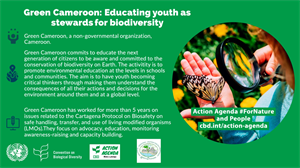 Action Agenda Commitment – Green Cameroon
Action Agenda Commitment – Green Cameroon
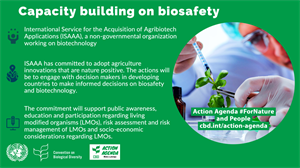 Action Agenda Commitment – ISAAA
Action Agenda Commitment – ISAAA
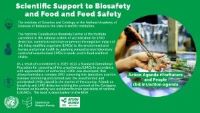 Action Agenda Commitment - Belarus
Video of biosafety commitments on the Action Agenda
Action Agenda kiosk at Place Quebec at the fifteenth meeting of the Conference of the Parties to the Convention and the tenth meeting of the Conference of the Parties serving as the meeting of the Parties to the Protocol
Photos from new biosafety commitments at the Action Agenda booth at the fifteenth meeting of the Conference of the Parties to the Convention and the tenth meeting of the Conference of the Parties serving as the meeting of the Parties to the Protocol
Action Agenda Commitment - Belarus
Video of biosafety commitments on the Action Agenda
Action Agenda kiosk at Place Quebec at the fifteenth meeting of the Conference of the Parties to the Convention and the tenth meeting of the Conference of the Parties serving as the meeting of the Parties to the Protocol
Photos from new biosafety commitments at the Action Agenda booth at the fifteenth meeting of the Conference of the Parties to the Convention and the tenth meeting of the Conference of the Parties serving as the meeting of the Parties to the Protocol
More commitments regarding the Action Agenda for Nature and People from non-State actors can be made towards Target 17 of the Global Biodiversity Framework and the Implementation Plan and Capacity-building Action Plan for the Protocol are welcome at
Action Agenda Portal
Biosafety Anniversary 2023:
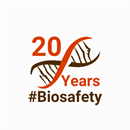 Anniversary website
Press release: 20th anniversary of the entry into force of the Cartagena Protocol on Biosafety
Anniversary website
Press release: 20th anniversary of the entry into force of the Cartagena Protocol on Biosafety
On 11 September 2023, 7:00 a.m., the SCBD will hold a webinar on the celebration of anniversary. To register, please visit
Webinar
International Day for Biological Diversity (IDB), 2023
International Day for Biodiversity – Convention on Biological Diversity
Theme: “From Agreement to Action: Build Back Biodiversity"
Kunming-Montreal Global Biodiversity Target 17: messages for the International Day for Biological Diversity and beyond
Statistics
Parties to the Protocol and the Convention on Biological Diversity
Statistics:
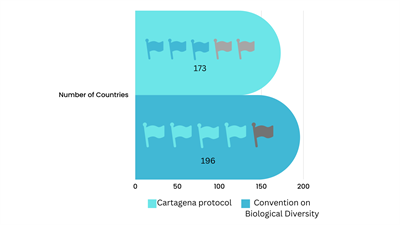
53 Parties to the Nagoya – Kuala Lumpur Supplementary Protocol to the Cartagena Protocol on Biosafety
Ukraine ratified the Nagoya – Kuala Lumpur Supplementary Protocol to the Cartagena Protocol on Biosafety, 18 August 2023
Recent and forthcoming biosafety-related events
Recent events
The second part of the tenth meeting of the Conference of the Parties serving as the meeting of the Parties to the Cartagena Protocol on Biosafety and the second part of the fifteenth meeting of the Conference of the Parties to the Convention on Biological Diversity
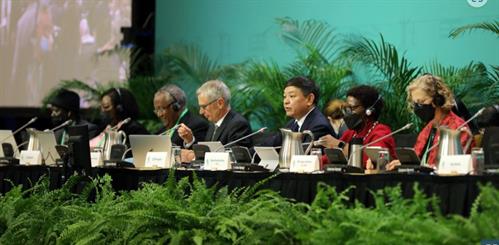
See section above.
International Conference on GMO Analysis and New Genomic Techniques
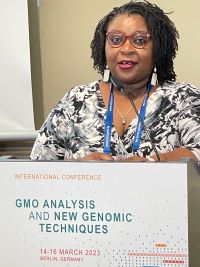
The International Conference on GMO Analysis and New Genomic Techniques was held in Berlin from 14 to 16 March 2023. The event brought together scientists and experts from across the globe to discuss the new developments in the field of detection and identification of LMOs. Since the methods for detecting genetic modifications in products and assigning them to an LMO have become more and more scientifically and technically refined in recent years, the Conference offered a forum for scientific exchange on the status of and challenges in traceability, detection and identification of genetic modifications. The Conference also contributed to knowledge transfer and capacity-building for professionals and laboratories involved in the detection and identification of LMOs, and served as a platform for networking.
First round of the Online Forum on Risk Assessment and Risk Management
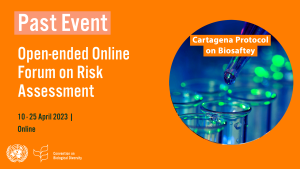
The Secretariat convened the first round of the Online Forum on Risk Assessment and Risk Management, from 10 to 25 April 2023, to collect views on elements to be included in the outline for additional voluntary guidance materials. The Forum was moderated by Luciana Pimenta Ambrozevicius (Brazil). A total of 97 Parties, two non-Parties and 34 organizations participated in the forum. The Forum was based on the following elements: (a) the Conference of the Parties agreed to develop additional voluntary guidance materials to support case-by-case risk assessment LMOs containing engineered gene drives in accordance with annex III to the Cartagena Protocol; (b) it decided that this material should have a special focus on engineered gene drive mosquitoes taking into account the current experience with the organism, the type of gene drive and specific issues of risk assessment, including existing reports, general considerations of LMOs containing engineered gene drives and existing national and regional risk assessment experiences; and (c) it established an ad hoc technical expert group and requested the convening of the Online Forum to contribute to this process.
The Informal Advisory Committee on the Biosafety Clearing-House
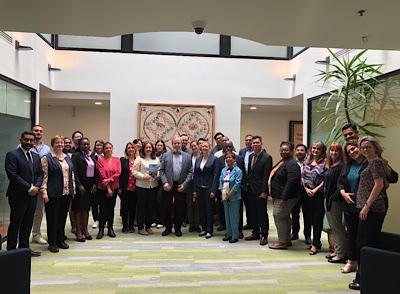
The Informal Advisory Committee on the Biosafety Clearing-House (BCH-IAC) was held on 15 to 16 May 2023 in Montreal, Canada. The meeting was attended by the members of the Committee from 13 Parties, 1 non-Party and from 4 organizations. Mr. Tim Strabala, New Zeeland, was the Chair of the meeting. Participants were invited to consider: 1) The Status of the Biosafety Clearing-House: latest developments and current and planned activities; 2) Decisions adopted at COP 15 and COP-MOP 10; 3) Collaboration on the UNEP-GEF BCH III Capacity-Building Project; and 4) Collaboration with biosafety-related organizations.
Communication, education and public awareness fair (CEPA Fair) biosafety event at the tenth meeting of the Conference of the Parties serving as the meeting of the Parties to the Protocol
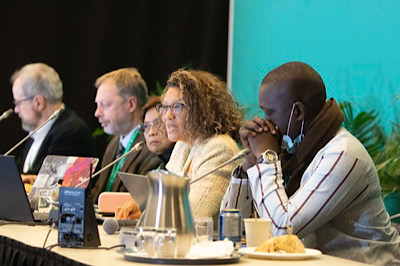
On 9 December 2022, during the second part of the tenth meeting of the Conference of the Parties serving as the meeting of the Parties to the Protocol, the Secretariat held an event on communication, education and public awareness event on the risk analysis process in support of the implementation of the Protocol. The event gave the opportunity to share information on the importance of the communication, education and public awareness elements for that process, and to highlight national biosafety framework procedures in place to ensure the transparency of risk assessments, as well as systems in place that will enable Parties to undertake risk assessment of LMOs. Four experts from different regions made presentations and more than 40 participants attended.
Further information and presentations from the experts are available
here.
Biosafety Clearing-House training workshop
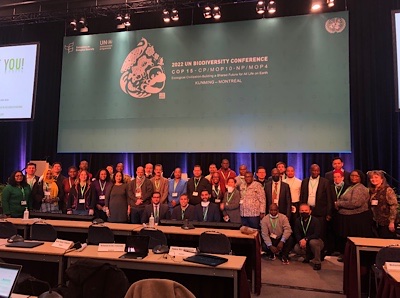
A Biosafety Clearing-House training workshop was co-organized by the Secretariat and the UNEP-GEF BCH III Project in Montreal from 5 to 6 December 2022, on the margins of the tenth meeting of the Conference of the Parties serving as the meeting of the Parties to the Protocol. The main objectives of the workshop were to provide general information on the Biosafety Clearing-House, its relevance to the Protocol and its role in the exchange of information about decisions on LMOs, and to present the new Biosafety Clearing-House interface. It included hands-on training on searching and submitting information, the examination of case studies and discussion sessions about the Biosafety Clearing-House. The workshop was attended by the national focal points and national authorized users of the Biosafety Clearing-House from Parties to the Protocol.
Side event on the launch of the Biosafety Clearing-House at the tenth meeting of the Conference of the Parties serving as the meeting of the Parties to the Protocol
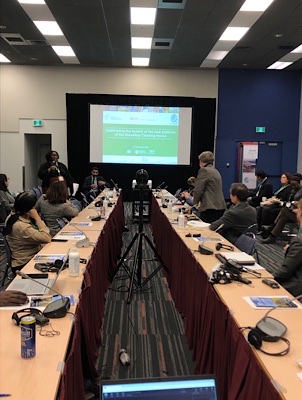
Through financial support from the UNEP-GEF BCH III Project, the Secretariat hosted a side event on 15 December 2022, on the margins of the tenth meeting of the Conference of the Parties serving as the meeting of the Parties to the Protocol, to celebrate the launch of the new platform of the Biosafety Clearing-House. Owing to the coronavirus disease (COVID-19) pandemic, the new platform had been launched online, on 29 November 2021. During the side event, the Secretariat briefly presented the new platform and described its success, one year on.
Side event on the launch of Biosafety Technical Series No. 5: Training Manual on the Detection and Identification of Living Modified Organisms in the Context of the Cartagena Protocol on Biosafety at the tenth meeting of the Conference of the Parties serving as the meeting of the Parties to the Protocol
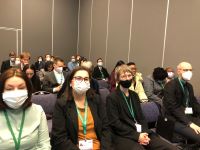
The Secretariat held a side event on 13 December 2022, on the margins of the tenth meeting of the Conference of the Parties serving as the meeting of the Parties to the Protocol. In its decision 9/11, the Conference of the Parties had requested the Executive Secretary to review and finalize the manual on detection and identification of LMOs, ensuring consistency and language in scope with Article 17 of the Protocol, which led to its publication as issue No. 5 in the Biosafety Technical Series. The English version of the training manual had been previously made available at a launch webinar (recording available online). However, at the time of the event, the manual had been made available in the six official languages of the United Nations. The manual is a key resource for the implementation of the Protocol and raises awareness of the importance of the detection and identification of LMOs. During the event, the Secretariat gave an overview of the contents of the manual, while invited speakers shared their reflections on how it would contribute to global capacity-building and the programmes of work under the Protocol.
South, South-East and Pacific Asia training course on risk assessment of living modified organisms

With support from the Government of the Republic of Korea, through the Korea Biosafety Capacity-Building Initiative, the Secretariat convened a workshop on risk assessment of LMOs in Manila from 7 to 11 November 2022 for South, South-East and Pacific Asia. Overall, 58 participants from 37 countries and four organizations received training. The objectives of the workshop were to provide theoretical and practical training in the risk assessment process (concepts, steps, methodology and key issues to consider) and hands-on training in the evaluation of case studies of LMOs for environmental release, identifying protection goals and applying the risk assessment methodology to develop and assess risk scenarios.
Multidisciplinary Ad Hoc Technical Expert Group for Synthetic Biology
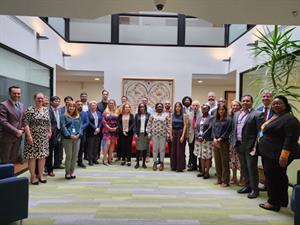
The Secretariat held the multidisciplinary Ad Hoc Technical Expert Group for Synthetic Biology, from 11 to 14 July 2023. 2. The Conference of the Parties established a multidisciplinary ad hoc technical expert group on synthetic biology (“multidisciplinary Expert Group”) to support the process for broad and regular horizon scanning, monitoring and assessment, in accordance with the terms of reference contained in section B of the annex of to decision 15/31. The meeting was attended by experts from 13 Parties, 1 expert from a non-Party, 10 experts from organizations and one expert representing indigenous peoples and local communities. The meeting discussed the implementation of the mandate, including the process for broad and regular horizon scanning, monitoring and assessment of the most recent technological developments in synthetic biology, steps for broad and regular horizon scanning, monitoring and assessment and trends in synthetic biology and clarification of the scope of the broad and regular horizon scanning, monitoring and assessment process.
Forthcoming events
Open-ended Online Forum on Risk Assessment, 21 - 25 August 2023, Online (Ongoing).
Participate
20th anniversary of the Protocol Webinar, 11 September 2023, 7:00 a.m. EST.
Registraion
Resumed second part of the tenth meeting of the Conference of the Parties serving as the meeting of the Parties to the Cartagena Protocol on Biosafety, 19 - 20 October 2023, Nairobi, Kenya
20th anniversary of the Cartagena Protocol on Biosafety event, 19 October, Nairobi, Kenya (Tentative)
Eighteenth meeting of the Compliance Committee under the Cartagena Protocol on Biosafety, 24 - 26 October 2023, Montreal, Canada
Global risk assessment workshop, 30-31 October 2023
Ad Hoc Technical Expert Group on Risk Assessment of Living Modified Organisms, 1 - 3 November 2023, Montreal, Canada Joint Convention on Biological Diversity-Aarhus Convention round table on public awareness, education and participation regarding living modified organisms, 11 and 12 December 2023
Second meeting of the multidisciplinary Ad Hoc Technical Expert Group on Synthetic Biology, fourth quarter of 2023 (tentative)
Second meeting of the Ad Hoc Technical Expert Group on Risk Assessment and Risk Management, first quarter of 2024 (tentative)
Fifteenth meeting of the Liaison Group on the Cartagena Protocol on Biosafety, first quarter of 2024 (tentative)
Nineteenth meeting of the Compliance Committee under the Cartagena Protocol on Biosafety, second quarter of 2024 (tentative)
Meeting of the Network of Laboratories for the Detection and Identification of Living Modified Organisms, fourth quarter of 2024 (tentative)
Twenty-sixth meeting of the Subsidiary Body on Scientific, Technical and Technological Advice, 13–17 May 2024 (tentative)
Fourth meeting of the Subsidiary Body on Implementation, 25–31 May 2024 (tentative)
Fifth meeting of the Subsidiary Body on Implementation, 16–18 October 2024 (tentative)
Sixteenth meeting of the Conference of the Parties to the Convention on Biological Diversity, 21 October–1 November 2024 (tentative) Eleventh meeting of the Conference of the Parties serving as the meeting of the Parties to the Cartagena Protocol on Biosafety, 21 October–1 November 2024 (tentative)
News stories*
Editors:
Ulrika Nilsson
Wadzanayi Mandivenyi
Nicole Appleton
Shi Xiaohan
Photo credit:
IISD Ulrika Nilsson
Archive:
Previous newsletter issues
Subscription:
Newsletter subscription
Twitter
Facebook
Disclaimer: The designations employed and the presentation of the material in this publication do not imply the expression of any opinion whatsoever on the part of the Secretariat of the Convention on Biological Diversity concerning the legal status of any country, territory, city or area or of its authorities, or concerning the delimitation of its frontiers or boundaries. The views expressed in this publication are those of the authors and do not necessarily reflect those of the two secretariats, nor does citing of trade names or commercial processes constitute endorsement.